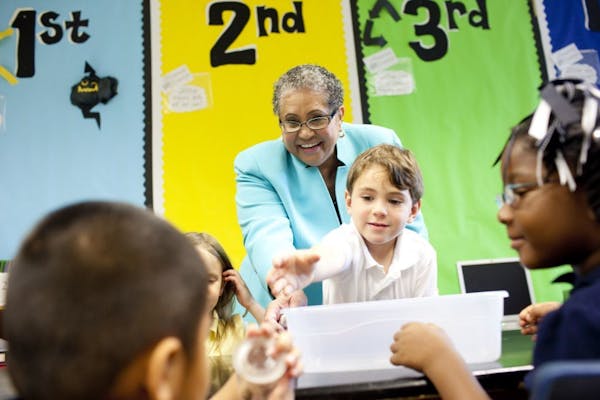All of us who have dedicated our careers to education share the goal of providing every Minnesota student with a world-class education. When measured only by test scores, our best efforts still fall short for too many. Our urgent priority must be to boost the achievement of all students closer to the levels of our most successful students.
According to some, the answer is to burden students and teachers with more of the same old tests. In "We can't ease our way to student achievement" (April 1), two leaders of major Minnesota business organizations advocated that strategy, claiming that the past decade of testing has improved results. I disagree.
The data show clearly that testing our children to greatness has been a failed experiment.
Even after implementation of the current Graduation-Required Assessments for Diploma (GRAD) exams, Minnesota's graduation rate has not significantly increased. Nor are students better prepared when they get to college. Minnesota ranks just average in overall graduation rate, and its graduation rates for students of color are the worst in the nation. Progress on the GRAD exams themselves has been equally flat. Students have shown less than a 1 percent improvement in math and less than a 2 percent improvement in reading on tests they must take to graduate. That is too little progress.
Consider also the damage caused by inappropriate testing on the lives of too many of our children. Think about the third-grade students who go home in tears, believing they are failures for life because they performed poorly on a test. Look at the effects on fourth-grade children who have special needs, or who are not yet proficient in English, yet who are forced to take the same test a second and even a third time and suffer that stigma. No parents want that for their children. And ask teachers throughout Minnesota how these high-stakes tests have stifled students' love for learning and have replaced it with weeks of rote memorization and entire school years of remedial coursework.
It is absurd to require high school juniors to either pass a state math test or fail that test three times in order to graduate. Consider, too, the unfairness of evaluating a student's entire academic career based on an arbitrary score from a 50-item bubble test.
When "No Child Left Behind" became federal law a decade ago, nine of the 10 members of Minnesota's congressional delegation voted against it. They did not believe excessive testing would improve either our state's overall graduation rates or the graduation rates for students of color. They were right.
In any other situation, business owners getting unsatisfactory results year after year would not keep defending the status quo; they would look for a better strategy. So why are business representatives at the State Capitol suggesting that we continue what hasn't worked?
Let's be clear: No one is suggesting that Minnesota eliminate student testing. No one has suggested lowering our standards. No one has suggested changing any course requirements. In fact, the legislative proposals under consideration would require students to take more rigorous tests in high school.
The difference is that students would take tests that actually matter — tests that would better measure their readiness for college and career; tests that would help them understand their aptitudes and interests; tests that would help teachers and parents better meet each student's needs. This proposed new testing system would better align with the admission requirements at Minnesota's colleges and universities. The reforms would help reduce the need for students to take remedial courses once they get to college. Parents would have assurance that their children are taking tests that will prepare them to succeed.
Measuring student achievement is important. However, the most significant actions we can take to improve student achievement are to invest in initiatives that really work. This legislative session gives us that opportunity.
We need to invest in early childhood education, to help every child come to kindergarten ready to learn. All-day kindergarten will help us ensure that every child is reading at grade level by the end of third grade. Let's give teachers the training, resources and support they need to succeed. Let's recognize and appreciate them for the many successes they do achieve, every day of every school year.
Minnesota employers have a vested interest in the quality of our education system and a crucial stake in the preparedness of our workforce. Their input is valued; their partnership is crucial. Working together, surely we can find a testing system that serves the best interests of all Minnesota students.
-----------------
Brenda Cassellius is Minnesota's education commissioner.
